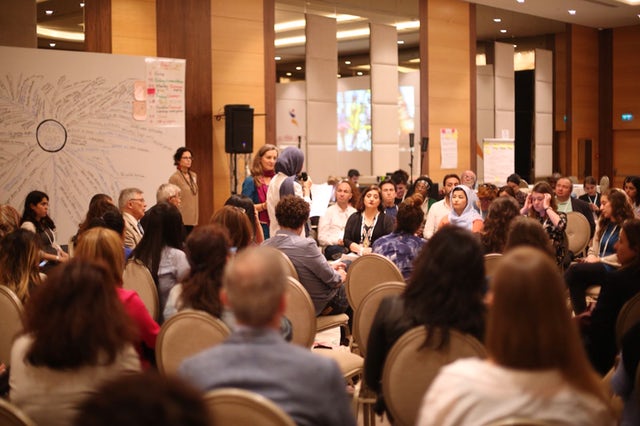|
Sana Mustafa, Founding Member, The Network For Refugee Voices We don’t accept all-male panels on women’s issues, so why do we still discuss refugee policy without refugees, asks entrepreneur Sana Mustafa. Beyond tokenistic inclusion of refugee stories, she argues that meaningful participation requires major institutional shifts. I was recently invited to deliver a keynote address at an event on refugee inclusion. A crowd, dressed in business casual, packed out the event space. The master of ceremonies bellowed over the loudspeaker, “Please join me in welcoming a Syrian refugee to the stage.” I cringed. In a fleeting moment the event organizers had undermined the very project they had set out to address: empowering refugees. I had asked them to introduce me like they would anyone else, by my resume. By introducing me by my legal status, they had stripped me of my agency, further entrenching the narrative of dependent, passive refugees. My name is Sana Mustafa. I am the founder of a consulting company, a co-founder of the international Network for Refugee Voices, and yes, a Syrian refugee. Today’s practice of refugee participation typically equates to a refugee recounting their journey at the beginning of an event. Storytelling can be a helpful tool to shift xenophobic narratives about refugees, but it is not enough. Meaningful refugee participation requires a rethink of the international humanitarian support and development landscape. We must uproot the traditional, top-down, structure of humanitarian aid and initiate a participatory, bottom-up, approach to refugee policy. Refugees must be given a seat at the table to participate in existing conversations about refugee policy and empowered to create their own spaces. This call for inclusion via participation is not new. We have been fighting for decades for the inclusion of minority groups in conversations about their futures. I would like to believe that gone are the days where an international institution would host a conference on women’s rights without inviting women to participate. However, until now, international discussion on the refugee issue has largely tokenized refugees and attempted to make decisions without refugees themselves having a substantive say. At the United Nations, for example, where countries are negotiating a new global compact on refugees, refugees have been allowed into the negotiation room, but only as observers. I have attended countless panels about the “refugee experience” that had zero refugee representation. Imagine if in this era, there was a women’s rights policy being negotiated where women were allowed to observe, but not speak. Or a panel about the “female experience” without any women. Would we, as global citizens, stand for that? Imagine if in this era, there was a women's rights policy being negotiated where women were allowed to observe, but not speak. There are some organizations that are doing refugee participation well. Oxfam International recently hosted an International Refugee Congress that engaged refugee-led groups and host countries as key actors. WeWork hired refugee consultants to advise on their World Refugee Day campaign on cultural sensitivity. The United Nations Refugee Agency (UNHCR) has formed a Global Youth Advisory Councilof young refugees. Independent Diplomat provides diplomatic advice to refugee leaders to inform their participation in global policy discussions. Some non-governmental organizations, like the Refugee Council of Australia, that have traditionally been responsible for representing refugee views in international policy discussions are instead funding refugees to travel to conferences to represent themselves. Perhaps most inspiring, however, is the initiative refugee-led groups are taking to redefine refugee participation and inclusion. Refugees are leading by example. Next week, a group of over 70 refugee leaders from around the world will descend upon Geneva to convene the Global Summit of Refugees. The summit will be the first ever strategic-level meeting of refugees, run by refugees, in the interests of refugees. Conceived by group of nine refugee leaders from Syria, Colombia, South Sudan, the Democratic Republic of Congo, Myanmar and Afghanistan, living on six different continents, Global Summit refugee participants represent 26 countries of origin and 34 hosting countries. If there is one message that echoes forth from the Global Summit it will be: “Nothing about us, without us.” Full Article
0 Comments
Leave a Reply. |


